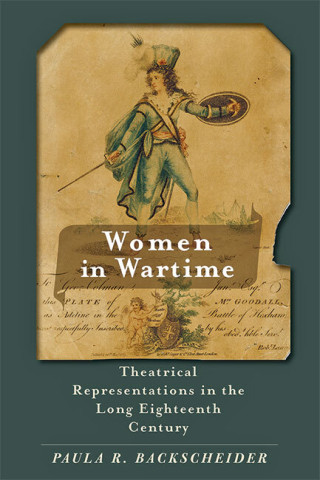
Johns Hopkins UniversityEst. 1876
America’s First Research University
Getting to Know Camp Followers

by Paula Backscheider, author of Women in Wartime: Theatrical Representations in the Long Eighteenth Century
Getting to Know Camp Followers
When I began the research for Women in Wartime, I was simply looking at how wartime women were represented on the stage. What were they like? What did they do? In what familiar plots did they appear? The content of this blog draws upon and stands upon the foundation of numerous diligent researchers. My book supplies both citations and a historical appendix.
I began this research and writing with plays in a period I thought I knew extremely well in a warm-up chapter to be titled “In the Shadow of Marlborough’s War.” Among them were Farquhar’s The Recruiting Officer, Steele’s Lying Lover, and Centlivre’s Beau’s Duel. My first publication had been on a text I believe should be attributed to Defoe, “A Short Narrative of the Life and Actions of His Grace John, D. of Marlborough” (Augustine Reprint #168, Year 28, 1973-74). I wrote it while I worked on my dissertation, and in crazed-graduate student mode had even read most of Winston Churchill’s 4 -volume biography of his ancestor. I was prepared!
And then there was Charles Shadwell and his camp followers. In his Humours of the Army (1713) set in a frontline camp on the peninsula, a major enters with much-needed recruits followed by two common soldiers’ wives who were definitely not the stereotyped daggle-tailed sex workers. They had shared the trip from Falmouth, Cornwall, then the five-day trip to Lisbon, and then the ten-day march to the camp. They are greeted by a matter-of-fact Serjeant who questions them. One wife offers the fact that she carried her husband’s knapsack from Lisbon and asks, “what is the main Sign of a Wife, but doing all his Drudgery?” He advises her to leave her husband and hire herself out to wash the linen of a higher-class group of officers, the grenadiers.
Shadwell, like Farquhar and Steele, had served in the army in the same war and lived and worked beside such women. Everything changed. Immediately, what I didn’t know exploded my peaceful, confident plan for what I expected to organize. I discovered that military officers observed that the married soldiers “fared better” and did more because of the work of “their husbands’ mules.” As the historian Barton Hacker said, “Women’s work was necessary …and so taken for granted as to be all but ignored.” Detailed regulations underscored their importance. Some were put on the muster rolls and many were assured paid work. For example, officers were to divide their laundry among sergeants’ wives, and soldiers’ laundry was to be distributed in equal proportions among the other women of the companies. Those without appointments could still earn money by accepting bachelors and lower-class clients.
As my book documents and describes, at this time the women who accompanied the men into the field were essential parts of the infrastructure. They gathered firewood, cooked, did laundry, gave first aid, mended clothing, foraged for food, set up and broke camp, carried extra gear, and a few were teamsters. After an early battle in the War of the Spanish Succession, General Marlborough ordered all of the widows with his troops to begin serving as nurses immediately and to be paid subsistence.
Humours of the Army became an essential part of theatre history for the rest of the century and changed my interpretation of The Recruiting Officer. The next post will continue these stories of the camp followers.
(See previous news items, Who Makes Meaning? What Does My New Book Do?, and Military Recruiting).




